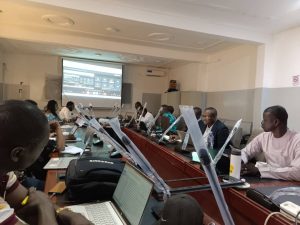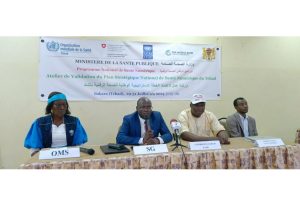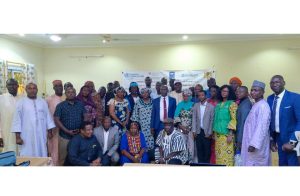Background
Chad is a landlocked country in north-central Africa, bordered by Libya to the north, Sudan to the east, the Central African Republic to the south, and Cameroon, Nigeria, and Niger to the west. The country spans both the Sahara Desert in the north and more fertile regions in the south.
Key Facts
- Population: Over 18 million (2025 estimate)
- Capital: N’Djamena
- Languages: French and Arabic (official), with more than 100 local languages and dialects spoken across the country
- Religions: Islam (predominantly in the north), Christianity (mainly in the south), and indigenous
Overview
Chad’s vast geography and limited road networks have historically hindered health data aggregation. HISP Rwanda commenced work in Chad in early 2020, partnering with Chad’s Ministry of Public Health and various NGOs to modernize the country’s disease surveillance and routine reporting systems. Key objectives included deploying DHIS2, training local IT personnel, and developing a malaria-specific reporting tracker.
Our Work:
- National DHIS2 Configuration: Between March and June 2020, HISP Rwanda configured Chad’s national DHIS2 instance to include modules for maternal health, malaria, HIV/AIDS, and immunization. Data elements were mapped to the country’s standardized indicators, following Ministry guidelines. HISP consultants collaborated with the National Health Information System Directorate to finalize data definitions.
- Workshop Cascade Model: Given Chad’s 23 provinces (Logone Occidental, Wadi Fira, etc.), we adopted a cascade training model. HISP Rwanda trained 12 master trainers in N’Djamena, who then conducted provincial workshops. Over 600 health facility data clerks and district supervisors received hands-on DHIS2 training between July and December 2020

- Malaria Tracker Customization: Chad’s malaria burden demanded specialized attention. We developed a DHIS2 malaria tracker app that allowed weekly case reporting at health posts. The tracker included built-in validation rules (e.g., fever plus parasitological confirmation) to improve data accuracy. Weekly SMS reminders were automated for districts failing to report.
- Data Use Workshops: In late 2020, HISP facilitated data use workshops focusing on “data-to-action” principles. District health teams learned to interpret dashboard visuals and generate operational plans—for example, reallocating ITN (insecticide-treated net) supplies based on incidence maps.
- Integration with RCCE (Risk Communication): To synchronize community feedback with epidemiological data, we integrated a simple mobile survey tool that fed directly into DHIS2’s survey module. Community health workers in Ouaddaï and Mayo-Kebbi Est collected rumors and local outbreak reports, enabling real-time risk communication updates.


Impact
- Reporting Rates: Routine reporting improved from 52% to 88% nationwide within eight months, despite seasonal flooding in southern provinces.
- Malaria Case Management: The malaria tracker app facilitated weekly monitoring, contributing to a 15% reduction in severe malaria admissions in Batha region during the 2021 transmission season.
- Data-Driven Decisions: District teams in Guéra and Kanem began monthly planning meetings, using DHIS2 outputs to adjust drug procurement orders and staff allocations.
Partners
- Ministry of Public Health, Chad: Provided leadership, policy directives, and validation of DHIS2 data elements.
- Global Fund: Financed malaria tracker customization and ITN distribution analytics.
- UNICEF Chad: Funded data use workshops and supported procurement of tablets for online/offline data entry.
- Catholic Relief Services (CRS): Collaborated on mobile survey integration for RCCE activities.
Lessons Learned & Future Plans:
Sustained internet connectivity remains a challenge, particularly during rainy season. HISP Rwanda plans to expand offline data entry capacity by deploying DHIS2 Generic Data Entry (GDE) forms via USB drives for hard-to-reach facilities. Additionally, by 2025, we aim to develop a localized training-of-trainers (ToT) academy in N’Djamena to reduce reliance on external experts.